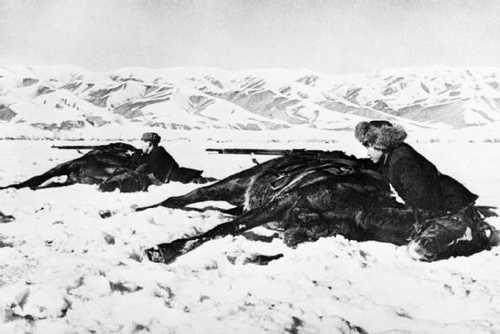
Warhorse - the reality.
Soviet Red Army Tatar cavalrymen take cover behind their horses on the Eastern Front. Much stir at the moment about Spielberg's new WW1 movie, "Warhorse". I have not seen it yet, and suppose I will give it a look. What I have heard so far suggests that it is hopelessly sentimentalised. It may prove "moving". "Convincing" ? I think not. War between humans has long been bad news for horses. From the Sumerian chariot-horse shot with arrows, to the Egyptian chariot-horse smashed in its harness, to the medieval charger crippled by caltrops and speared to death, to the Napoleonic cavalry horse blasted by cannon-shell, horses have had a pretty bad deal when their human masters fight. And that is not to mention the enormous number of draught horses consumed (often literally) in wars down the ages. This remained very true in WW1, in which all armies were very substantially dependent on draught animal transport; the predominant draught animal in Europe was the horse. Also, traditionalist generals were reluctant to let go of the idea that horsed cavalry had a continuing role in the age of mechanised warfare (Earl Haig was, after all, by background a "donkey walloper"), and horse-versus-Mauser/Lee Enfield/Maxim Gun/fragmentation shell was an equation not likely to favour the horse. It is not surprising that the first known casualties of both Belgium and Germany in WW1 were cavalrymen; doubt if their horses did very well, either. In WW2, the German Army at least continued to be heavily dependent on horses as draught animals; they requisitioned horses from all over Europe, and few of the horses concerned would have avoided death through violence or exhaustion. Not to mention eating. Where horsed cavalry was used (for example, by the Soviets in scouting and breakthrough operations, or by the Germans in anti-partisan campaigns) the rifle and machine equation was very much present. All in all, not much of a horse's life. Sorry about the rant; I hope that the tendency of most of us In Here to see through the sentimentality and romanticism often attached to war does not totally spoil our enjoyment of Mr Spielberg's ouvre. It is just the pictures, after all ... Yours from the stables, JR.
This is a companion discussion topic for the original entry at https://www.ww2incolor.com/gallery/soviet-forces/44032/warhorse-the-reality.
